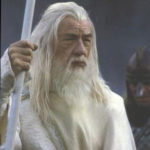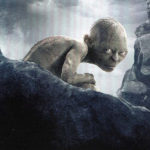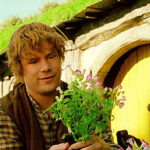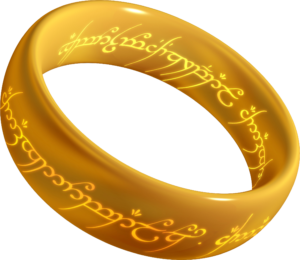Welcome, students. I’ve finally finished reading all 1,000+ pages of The Lord of the Rings.
I am biased, in a way: I grew up watching The Lord of the Rings as movies, so I knew the story almost by heart by the time I sat down with the original material. But there is so much that separates the original from the movies, not only in the medium, but in the mood and development of the story too. It not only looks different; it feels different.
The trilogy has its problems, but it is outmatched by what Tolkien does right. For example, Middle-Earth is astounding–the hobbits of the Shire, the mystical Elven-land of Rivendell, the forests of Lothlórien and Fangorn, the vast kingdom of the horse-land Rohan, the glorious realm of Gondor helmed by the white towers of Minas Tirith, and the dark and fiery Mordor. Its scope is matched with depth; Tolkien creates dynamic cultures from the ground up, founded on his beautifully invented languages.

Gandalf the Wizard
Tolkien’s characters are wonderful, and I’ve got three favorites–Gandalf, Gollum, and Sam. Gandalf, a wizard, is the voice of wisdom; he is the story’s mind and moral compass. Gandalf fights evil in many ways, but his chief method is through acts of love, and through the comfort of believing in the smaller things that tip the scales in times of war. He is, quite possibly, the most quotable character.

Gollum
Gollum is much more interesting to study–he has been torn apart by the dark magic of the One Ring, and the pieces of himself fight with each other. He calls the ring “my precious,” an excellent metaphor for materialism and what it does to the soul. He is the smallest of enemies, but he is dynamic, pitiable, terrifying, and integral to the quest of our characters.

Samwise Gamgee
And then there’s Sam. Samwise Gamgee is the heart of the story, and easily the most cherished character. He is Frodo’s servant and friend, and as Frodo dutifully bears the ring, Sam bears his master Frodo. Amidst the terrifying obstacles they face, Sam is incredibly brave, refreshingly hopeful, and unquestionably hilarious. He is also directly involved in every tearjerker moment, in both the books and the movies, and while the cost of their quest is greatest on Frodo, Sam’s place helps ground that cost back in the real world–in the hope that after such a journey, such a treasure as home can be regained.
The trilogy has flaws. The most glaring issue is the fact that it has, approximately, four female characters. Two of them are forgettable, one is an Elven queen (angelic beyond compare, so impossible to connect to), and the last is a warrior, who eventually gives up fighting for her kingdom when she finds true love. Feminism does not abound here.
On a personal note, Tolkien also suffers when it comes to exposition. The movies notably tighten the story, but the novel lags on in huge passages where Tolkien is simply trying to catch up with his characters’ tales, and it forces the reader to trudge through the narrative. The story seems to date itself when it handles conspiracy and secrecy, but because I know the movies so well, it could just be that the big reveals didn’t feel like much.

The One Ring
These issues aside, the depth of the world and the everlasting themes are the reason to read The Lord of the Rings. Environmentalism has its say on more than one occasion, most notably when the trees of Fangorn fight back against Saruman’s machine-like destruction of the forests. The ring’s dark power is temptation–characters succumb to pride, vengeance, greed, and selfishness, which speaks to the power of things and the frailty of humankind. Tales and songs act as meta-fiction, showing us that this is a great story as we read it–this is a kind of song, an epic journey for the ages, that helps us appreciate the stories we know and the stories we’re in.
Most importantly, we see a sprawling war hinge on the actions of a hobbit, the smallest of creatures in Middle-Earth, who has a greater strength than men twice his size: an inner strength, which is more powerful than an army of monsters. Through the small things–acts of love and kindness, trust, bearing our everyday burdens–we can change the course of the future.
My reading of The Lord of the Rings is unconventional–the movies helped me understand the book. I’d like to hear from others who just so happened to experience the opposite.
Your homework: if you read the story BEFORE watching the movies, take a minute to comment on what that experience was like! Was Tolkien’s work difficult to read without the assistance of the movies? Were you more critical of the movie adaptations than most? What did you think of Tolkien’s writing–not just the plot and the characters, but also his voice, style, exposition? Leave a comment below! (And I don’t want to be blatant, but the more thorough your answers are, the better your grade will be. I’m just saying.)
Up next, I’m reading the remarkably short novel The Picture of Dorian Gray by Oscar Wilde. I’m very excited about this–I’m a fan of Irish literature, but I’ve never read any of Wilde’s work. All I know about Dorian Gray so far is his portrayal in the graphic-novel-based movie The League of Extraordinary Gentlemen…so, basically, I know his name is Dorian Gray.
Hopefully, I’ll know more next week. See you then.
Prof. Jeffrey
Recent Comments